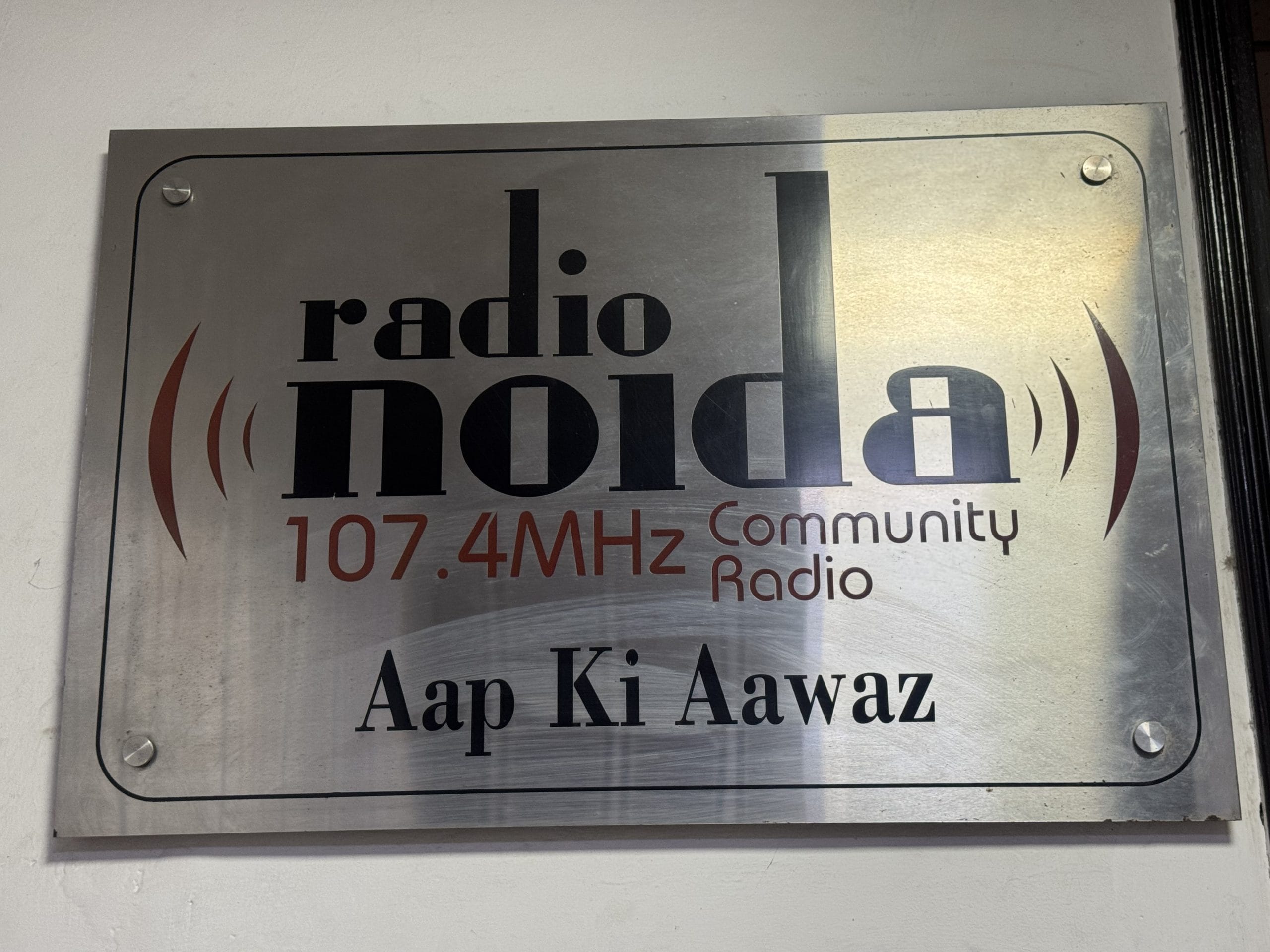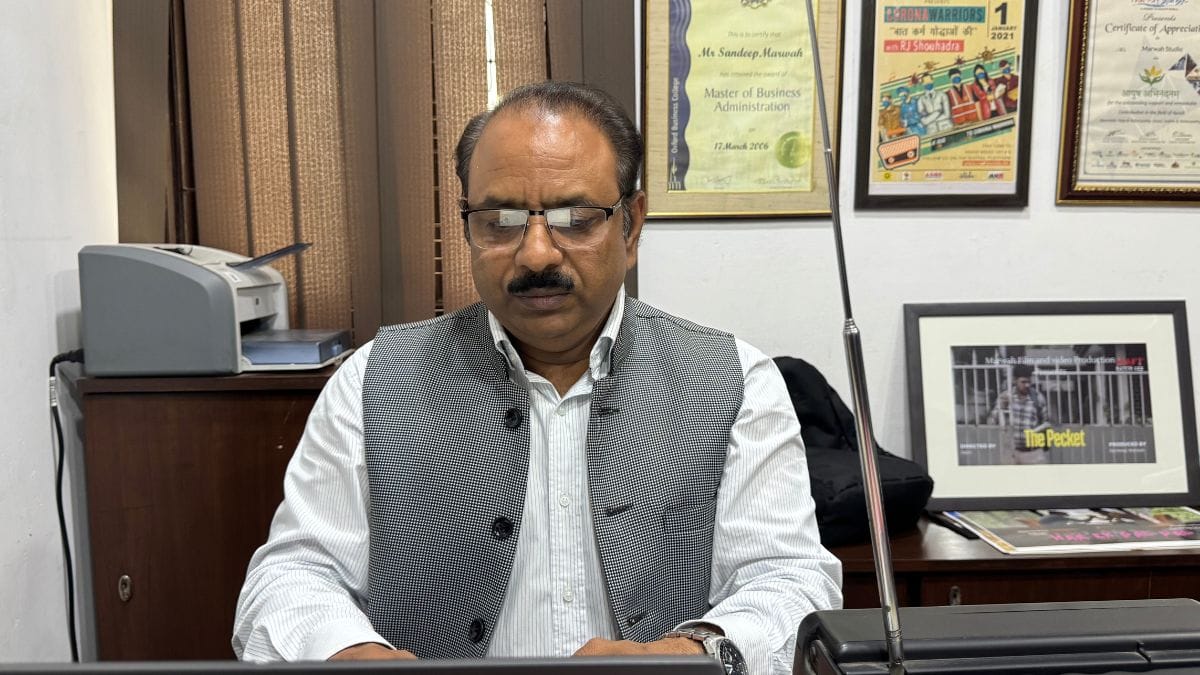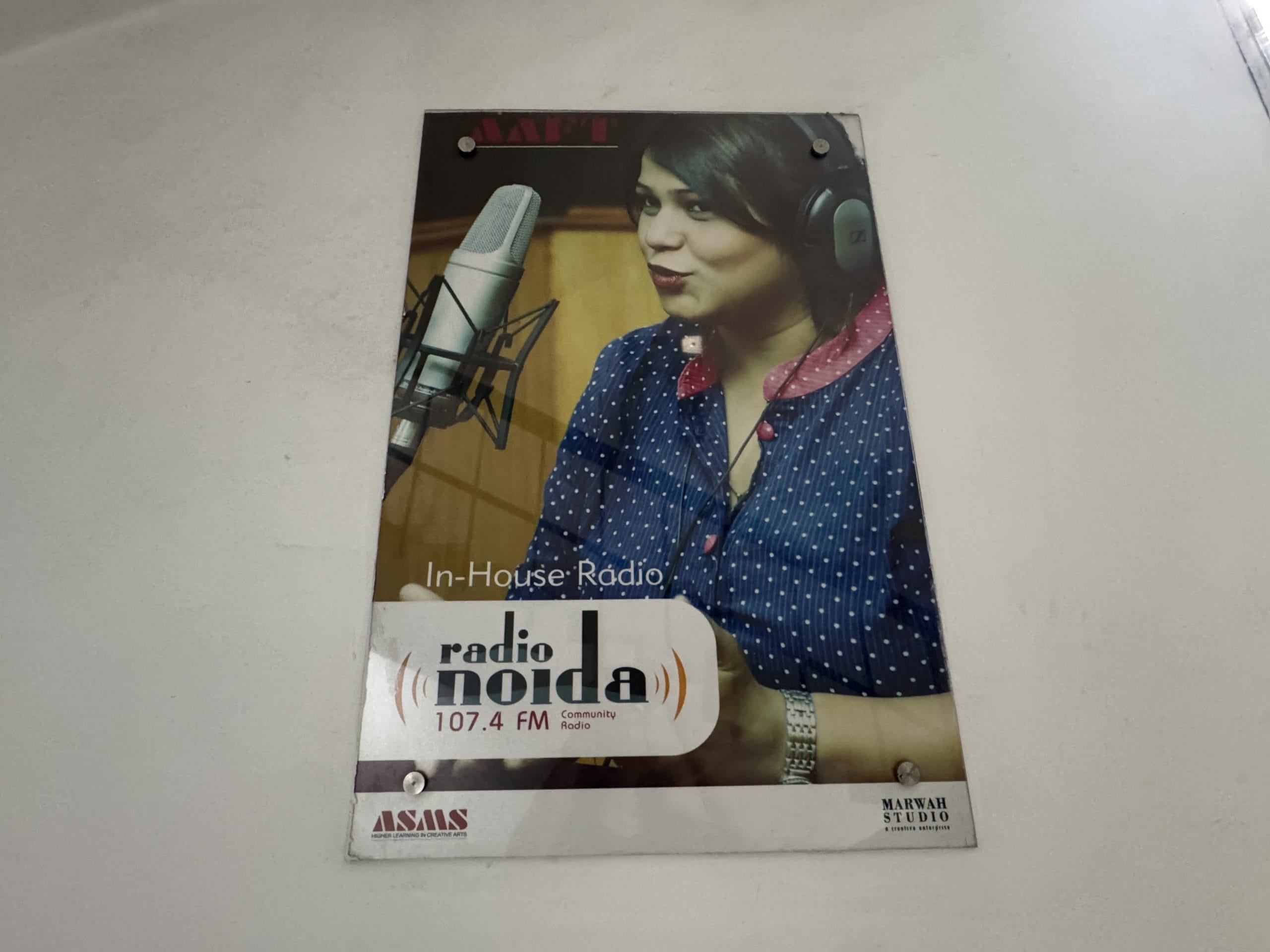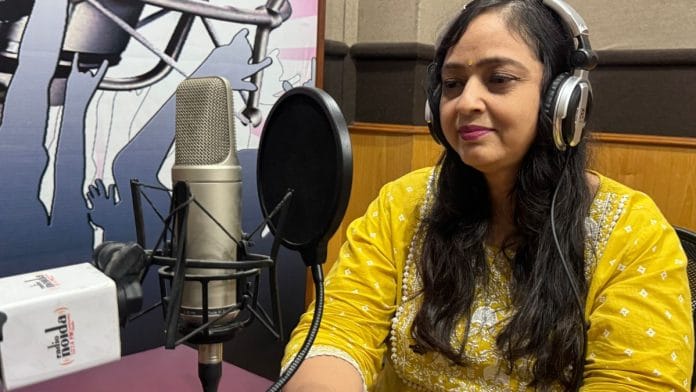Noida: Inside a small, soundproof studio, a man and a woman leaned into a dangling microphone, headphones snug over their ears. After a thumbs-up from behind the glass pane, a husky voice broke the silence: “Rom Rom bhai, lo mein aa gaya thara Tau aur yo thari Tai bhi aa gayi hai. Aur hum shuru karange yo Panchayat ka programme,” the man said, a wide smile spreading across his face. The duo transformed into Noida’s uncle and aunty on the city’s community radio, taking their voices to the rural belt of Noida — to the Gujjars and the Jats, communities often left out of the urban conversation.
“And the topic today is dowry, and how it continues to plague our society,” the woman said into the mic.
Noida has long been synonymous with real estate disputes, traffic jams, and potholed roads. But tucked away in a quiet corner of Film City in Sector 16, the community radio station 107.4 FM at Marwah Studios is weaving a new story of a collective identity.
From shows like Panchayat to No to Violence and Sanjeevani, along with segments on mental health, the station — on air since 2009 — has evolved alongside Noida’s own journey: from an extension of Delhi to a city in the NCR in its own right.
107.4 doesn’t just cater to white-collar IT workers commuting in their SUVs every morning. Its frequency reaches lesser-known pockets of rural Noida — unmarked sectors, slums, and migrant colonies filled with stories of domestic violence and dowry, largely ignored despite living under the radar of mainstream media.
I feel alive and confident now. Until recently, I had no identity of my own. But now, people know me as an independent woman. And my two daughters are the happiest — RJ Amita

This community radio isn’t part of the polished Noida narrative that focuses on swanky malls, high-rises, and the talk of surpassing its more cosmopolitan NCR neighbour, Gurugram. As Noida turns 50, this local frequency is trying to stay true to its community cause.
Its listeners are truck drivers, cab drivers ferrying tech workers to IT parks, factory workers sipping tea during breaks, students from across Uttar Pradesh, and young migrants chasing job opportunities. From sewage problems to household disputes and everything in between, the station covers it all.
Listeners send in their questions and concerns anonymously — and the station responds, giving people a voice. The radio jockeys at this station are residents of Noida themselves.
“This is Noida’s first and only community radio station, and it has witnessed the city evolve — from an unorganised township into a cosmopolitan hub,” said Sushil Bharti, director of 107.4 FM. “Amid the chaos of city life, our station offers a voice and a sense of belonging to Noida’s residents. The idea behind community radio is to connect with people, address their problems, and ensure that government schemes and programmes actually reach them.”

This is Noida’s first and only community radio station, and it has witnessed the city evolve — from an unorganised township into a cosmopolitan hub: 107.4 FM director Sushil Bharti
Also read: How Radio Mewat helped dispel Covid myths and more in India’s most ‘backward’ district
107.4 FM: A new identity on air
Amita Sharma joined 107.4 FM two years ago. For her, it was a moment of liberation. After spending 25 years as a housewife, she stepped out to carve an identity of her own. Today, Noida knows her as RJ Amita.
“I feel alive and confident now. Until recently, I had no identity of my own. But now, people know me as an independent woman. And my two daughters are the happiest,” said Sharma.
She hosts three shows — Bharat ki Veerangnaye, Women: The Achievers, and Ek Mulakat. She had no prior experience in radio. Everything she knows, she learned on the job, with help from station director Sushil Bharti.
“He would sit with me for half an hour every day,” Sharma said, recalling his suggestions: speak naturally, connect with the audience, choose the right music.
“Talk like you’re having a conversation — that’s what makes it real,” Bharti had told her when she started.
The first time her 17-year-old daughter heard her on air, she couldn’t believe it. “Mom, you sound like a professional! It doesn’t seem like you’re new to this,” Sharma recalled, smiling.
Today, her shows are not only sources of public knowledge, they have become bedtime stories of her children. Last week, for Bharat ki Veerangnaye, Sharma researched Lakshmi Kayala, a member of the Rani of Jhansi Regiment, an all-women wing of the Indian National Army (INA), led by Subhas Chandra Bose.

Sharma had never heard of her. After reading about Kayala’s life, she said, she felt a deep sadness.
“It felt like so many women warriors, leaders, and changemakers have been erased from history.” The story of Kayala, who joined the army as a young recruit, filled her with a renewed sense of purpose: to bring forward the untold stories of women who rose through the ranks to make their mark.
And now, the show feels more personal. “Just like I carved my own identity. I am carving new identities for these forgotten women, by telling the stories of their valour and resilience.”
Also read: Lessons through loudspeakers, community radio to help bridge digital gap in education
Radio that listens, builds community
While researching for their shows, director Bharti and his team of RJs travelled across Noida. Along the way, they came across Shiv Nagri, a slum area with a high number of school dropouts. After being contacted by an NGO, they launched Apna School, a learning initiative for the children of construction workers and other labourers. Currently, 10 such schools are running across Noida.
The radio station contributes to teacher salaries and infrastructure needs such as fans and toilets, all from its own resources.
“We sit in Film City, which is cosmopolitan and glamorous. There are glass buildings, high-rises, and wide roads. But that is not the only Noida. Through our research, we found that behind this glimmer are sectors, slums, and migrant colonies where a large part of Noida’s population lives,” said Bharti.
The station caters to these communities through programmes like Udaan Zindagi and Hausalon Ki Udaan, where children conduct panchayat-style discussions on their own issues and those affecting the larger community.
“The idea was to promote community. The anchor would be a child, and the hosts and guests would be children as well,” Bharti said.
We sit in Film City, which is cosmopolitan and glamorous. There are glass buildings, high-rises, and wide roads. But that is not the only Noida. Through our research, we found that behind this glimmer are sectors, slums, and migrant colonies where a large part of Noida’s population lives
Another show, Women: The Achievers, highlights women who are starting their second innings, those trying to step ahead and do something different.
“Such women are identified, and their stories are told to inspire other women,” said Bharti.
While community radio stations in India are not authorised to broadcast news, or speak on politics or religion, the RJs at 107.4 say they make it a point to focus on social issues that connect the community.
Breaking taboo, building dialogue
Anupama Bhardwaj held the mic and, in a mellow voice, began to talk about shame. Her voice rose and fell as she moved through topics like violence, menstruation, and reproductive health.
“Even if you’re living in a village, you can still take care of your reproductive health. And today, we have a gynaecologist to explain how to take care with minimal resources,” she said. “For me, my audience is those rural women whose backs are broken by patriarchy and who have no time to think about themselves.”
At Noida’s 107.4 FM, Bhardwaj is one of several women RJs who use radio to share information on health and social issues. She describes herself as a feminist and uses her programs to address taboos surrounding women’s health.
“We need to break the silence,” she said. “Because shame has no place in public health.”
Her shows — Sanjeevani and No to Violence — focus on these themes. She receives anonymous messages from women facing domestic violence and dowry demands, and reads them on air.
Bhardawaj is also from Noida. “The idea of community radio is to have people from the community speak, so that they can passionately talk about issues affecting their own society,” said Bharti.
According to him, shows are structured around the usual household routine. In the morning, when people are getting ready for the day, What’s New in Noida airs from 8 to 11 am, covering everything from pink autos and traffic rules to road diversions.
By 11 am, Bharti said, most homes are left with women or elderly people, and that’s when shows like Women: The Achievers and No to Violence are broadcast.
In the evening, when people return home, the station airs Sanjeevani, where doctors talk about health issues. The station wraps up the day with Ek Mulakat, a show about love stories, touching on loneliness, unrequited love, and the everyday struggles of living in a big city.
And once every month, Tau and Tai return to welcome Noida with stories from its lesser-known neighbourhoods.
“And Tai, is dowry a good thing?” Tau asked.
Tai roared into the mic: “No! Women are not a commodity. You can’t buy her.”
This article is part of a series called ‘Noida@50’. Read all articles here.
(Edited by Prashant)






